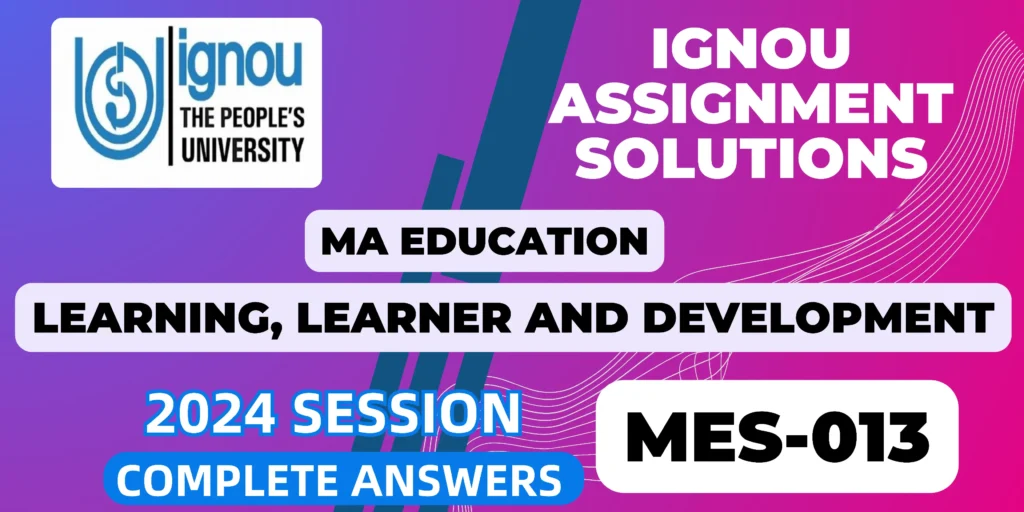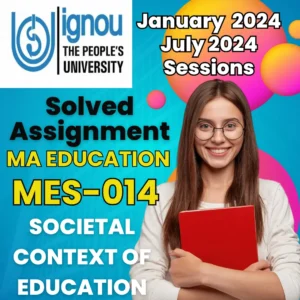IGNOU MES 013 Assignment Answer
MES-013
LEARNING, LEARNER AND DEVELOPMENT
Answer the following questions in about 500 words each:
1. Describe the classification of constructivism. Discuss the teaching learning activities you would organize to create a constructivist learning environment for introducing a topic to your students.
2. Discuss motivation and self-concept as factors affecting learning.
3. Discuss the influences of school environment on the learner with appropriate illustrations.
Answers
- Describe the classification of constructivism. Discuss the teaching learning activities you would organize to create a constructivist learning environment for introducing a topic to your students.
Classification of Constructivism:
Constructivism is a learning theory that emphasizes the active role of learners in constructing their own understanding and knowledge through experiences and interactions. It stands in contrast to traditional instructional approaches where knowledge is transmitted from teacher to student. Constructivism can be classified into several types, each emphasizing different aspects of learning:
1. Cognitive Constructivism:
– Developed by Jean Piaget, cognitive constructivism focuses on how individuals construct knowledge through cognitive processes. It emphasizes that learning is an internal process driven by the learner’s existing knowledge, mental structures, and experiences. Learners are seen as active participants in the learning process, constantly adapting and reorganizing their cognitive structures to accommodate new information.
2. Social Constructivism:
– Lev Vygotsky is a major proponent of social constructivism, which highlights the importance of social interactions and cultural context in the learning process. Vygotsky introduced the concept of the Zone of Proximal Development (ZPD), which represents the range of tasks a learner can perform with the guidance of a more knowledgeable other. Social constructivism asserts that knowledge is co-constructed through dialogue, collaboration, and social interactions.
3. Radical Constructivism:
– Proposed by Ernst von Glasersfeld, radical constructivism takes a more individualistic approach. It argues that reality is constructed by each individual based on their experiences, meaning that there is no objective reality outside of one’s perceptions. Knowledge, therefore, is seen as a personal construct that is continuously evolving as learners interpret and reinterpret their experiences.
4. Constructionism:
– Introduced by Seymour Papert, constructionism extends constructivism by emphasizing the importance of creating tangible artifacts as part of the learning process. Learners construct knowledge most effectively when they are involved in making something concrete, such as a model, program, or project. This hands-on, project-based approach allows learners to explore, experiment, and reflect on their understanding.
5. Critical Constructivism:
– Critical constructivism integrates the principles of constructivism with a focus on social justice and equity in education. It challenges the status quo by encouraging learners to question and critically analyze existing knowledge and power structures. This approach emphasizes the role of education in promoting social change and empowering learners to take an active role in their communities.
Creating a Constructivist Learning Environment:
To introduce a topic to students in a constructivist learning environment, it is crucial to design teaching and learning activities that align with the principles of constructivism. Here are some strategies:
1. Activate Prior Knowledge:
– Begin by connecting the new topic to students’ existing knowledge and experiences. You can use activities such as brainstorming sessions, KWL charts (Know, Want to Know, Learned), or discussions that allow students to express what they already know about the topic. This step helps students see the relevance of the new material and prepares them to integrate it with their current understanding.
2. Use Inquiry-Based Learning:
– Encourage students to ask questions and explore the topic through inquiry-based learning. Present a real-world problem or scenario related to the topic and ask students to investigate it. For example, if the topic is environmental conservation, you might ask students to explore how their community can reduce its carbon footprint. Inquiry-based learning promotes critical thinking and allows students to take ownership of their learning process.
3. Facilitate Collaborative Learning:
– Organize group activities where students can collaborate and share their ideas. Group discussions, peer teaching, and cooperative projects are effective ways to foster social constructivism. For instance, students could work in teams to research different aspects of a topic and then present their findings to the class. Collaboration helps students learn from each other and develop a deeper understanding through dialogue and negotiation of ideas. (Continue….)
2. Discuss motivation and self-concept as factors affecting learning.
Motivation and Self-Concept as Factors Affecting Learning
Learning is a complex process influenced by a variety of psychological, social, and environmental factors. Among these, motivation and self-concept are two critical components that significantly impact a learner’s ability to engage with, understand, and retain information. These factors not only affect the immediate learning outcomes but also contribute to a learner’s long-term educational success and personal development.
Motivation: The Driving Force Behind Learning
Motivation is the internal drive that prompts individuals to take action and pursue goals. In the context of learning, motivation determines the intensity, persistence, and quality of effort that a student invests in the learning process. There are two primary types of motivation: intrinsic and extrinsic.
1. Intrinsic Motivation:
– Intrinsic motivation refers to the drive to engage in an activity for its own sake, out of interest, curiosity, or personal satisfaction. Learners who are intrinsically motivated are more likely to be engaged, persistent, and resilient in the face of challenges. They see learning as an enjoyable and rewarding experience, which fosters deeper understanding and retention of knowledge. For example, a student who loves reading might spend hours exploring new books, not because of external rewards but because of the joy and satisfaction derived from the activity itself. (Continue…)
Click Here for Complete Answer
Download Complete Answer PDF
-
MA Education IGNOU MES-011 Assignment Solution
Original price was: ₹299.00.₹29.00Current price is: ₹29.00. Add to cart -
MA Education IGNOU MES-012 Assignment Solution
Original price was: ₹299.00.₹29.00Current price is: ₹29.00. Add to cart -
MA Education IGNOU MES-013 Assignment Solution
Original price was: ₹299.00.₹29.00Current price is: ₹29.00. Add to cart -
MA Education IGNOU MES-014 Assignment Solution
Original price was: ₹299.00.₹29.00Current price is: ₹29.00. Add to cart -
MA Education IGNOU MES-015 Assignment Solution
Original price was: ₹299.00.₹29.00Current price is: ₹29.00. Add to cart -
MA Education IGNOU MES-016 Assignment Solution
Original price was: ₹299.00.₹29.00Current price is: ₹29.00. Add to cart
Click Here download Assignment Question
ignou mes 013 assignment answer ignou mes 013 assignment answer ignou mes 013 assignment answer ignou mes 013 assignment answer ignou mes 013 assignment answer ignou mes 013 assignment answer ignou mes 013 assignment answer ignou mes 013 assignment answer ignou mes 013 assignment answer ignou mes 013 assignment answer









